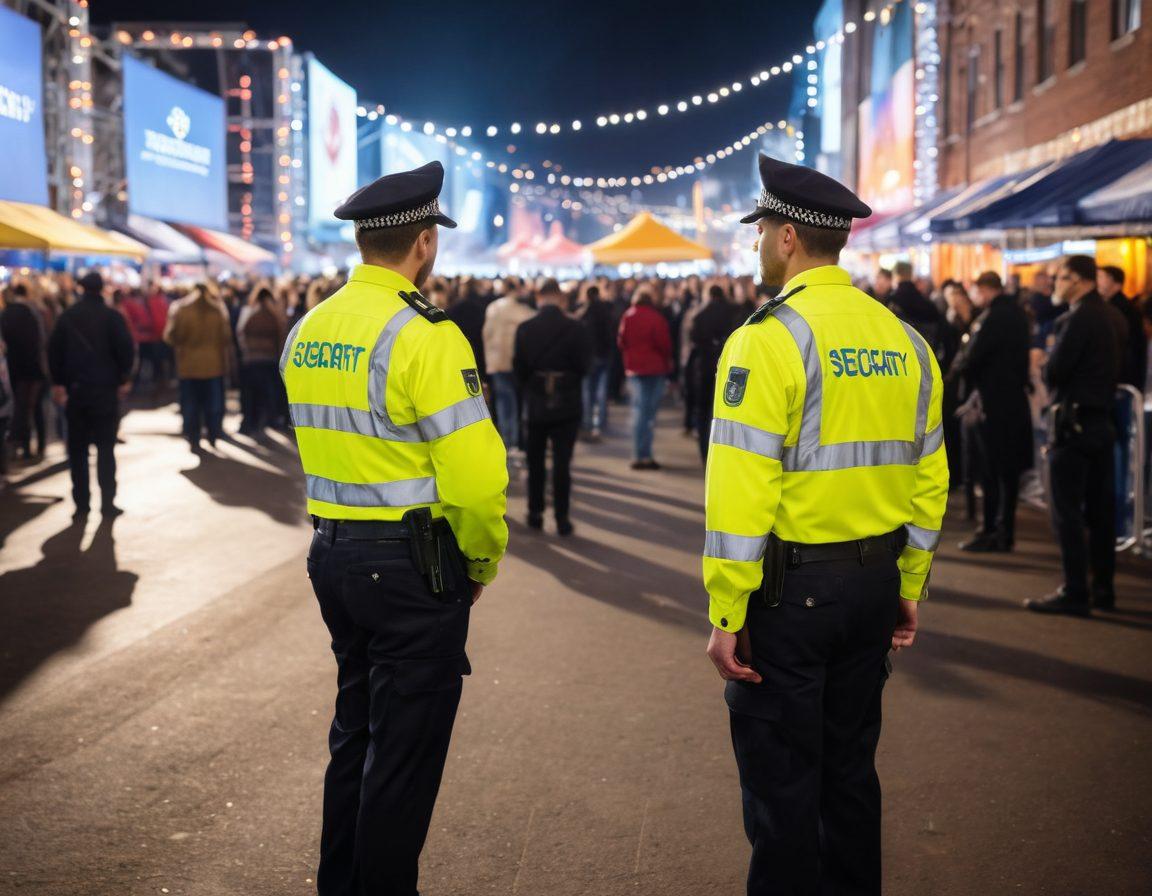Ensuring Safety: Top Strategies for Event Security and Crowd Management
When planning a successful live event, the excitement is palpable. However, amidst the cheers and applause, there lies an essential component that is often overlooked: crowd control. Imagine a bustling venue, brimming with energy and anticipation. Suddenly, chaos erupts as a celebrity enters the room or an unexpected announcement is made. This is where event security steps in, transforming potential pandemonium into organized jubilation. Why is mastering crowd control crucial for live event safety? Let’s delve into key techniques that are paramount for effective event security and crowd management.
First and foremost, a thorough risk assessment lays the groundwork for impeccable safety management. Before every celebration, whether it be a concert or a corporate gathering, security consulting helps identify potential threats. What if a crowd surge occurs? How can security personnel effectively respond? By conducting comprehensive event risk management planning, event organizers can anticipate challenges and determine precise strategies that enhance venue security. This proactive approach ensures that, in the event of an emergency response, the groundwork has already been laid for swift action.
Recognizing the human element in crowd management is critical. Event protection is not solely about barriers and exit signs; it’s about the relationship between attendees and security. Think about it: trust forms the backbone of a safe environment. Security services trained in interpersonal communication can diffuse tension, guiding guests rather than intimidating them. Picture a well-trained security team acting as friendly guides, offering assistance while keeping a watchful eye on the crowd. Isn't it reassuring to know that security personnel are there to protect without creating unease?
Furthermore, employing effective crowd control strategies enhances not only safety but also the overall experience at the event. Consider employing clear signage and utilizing designated pathways, allowing for calculated movement within the venue. Integrating technology can also revolutionize event logistics—real-time monitoring and surveillance systems can provide insights that inform on-site security decisions. With careful attention to detail, attendees remain engaged and focused on enjoying the event, rather than worrying about safety.
Finally, evaluate your techniques continuously. Hosting a post-event debrief that includes all involved—inclusive discussions around what worked and what didn’t—can refine future efforts. In the world of event safety, complacency is one of the greatest risks. Learn from each occasion and adapt your risk management strategies accordingly. As you gear up for your next big gathering, ask yourself: Are my crowd management practices as effective as they could be? With the right tools and mindset, mastering the art of crowd control is not just possible but achievable, ensuring that every celebration remains unforgettable for the right reasons.
Comprehensive Risk Assessment: Bolstering Safety for Live Events
When planning a live event, the excitement is often palpable. Whether it’s a concert, a festival, or a corporate gathering, the atmosphere brims with anticipation. Yet beneath this excitement lies a vital component that can’t be overlooked: comprehensive risk assessment. This crucial step in event security not only evaluates potential threats but also lays the groundwork for enhancing live event safety through crowd management and effective security services. So, let’s embark on a journey to discover how risk assessment can transform your events into safe and memorable experiences.
Imagine a bustling venue packed with eager attendees, all united by a shared passion for the experience ahead. But as the saying goes, 'it’s better to be safe than sorry.' A well-executed risk assessment can help identify vulnerabilities—whether that’s an unruly crowd, inclement weather, or security breaches. By understanding these risks upfront, event planners can implement measures such as on-site security, crowd control strategies, and proper emergency response plans, ensuring the safety of all attendees. Does your event have a strategy in place to address these potential challenges?
Safety management is not just a checklist to tick off; it’s a proactive approach to securing event protection. Engaging security consulting experts can provide a specialized view into specific venue security issues, from exit planning to crowd flow. They can help you navigate through event logistics that pertain to safety, ensuring that your team is prepared to handle any scenario. Remember, 'A good plan today is better than a perfect plan tomorrow.' So why wait until it’s too late to build a solid safety strategy?
Incorporating comprehensive risk assessments into your event planning makes it possible to foresee potential threats and counteract them effectively. This involves not only evaluating the physical security measures in place—like barriers and signage—but also the human element. Well-trained security personnel are essential for recognizing and mitigating risks. They act as the first line of defense, guiding attendees, managing crowds effectively, and responding quickly to any emergencies that may arise. Are your security teams equipped and empowered to handle challenges?
Event risk management doesn’t just serve to protect your guests; it fortifies your entire brand. A well-executed event, where attendees feel safe and secure, enhances your reputation as a quality organizer. A few negative incidents can tarnish the perception of even the most spectacular events, making it crucial to invest time and resources into thoughtful risk assessments. Ask yourself: How can you elevate your event’s safety and ultimately create an enjoyable atmosphere for everyone involved? The answer might just lie in starting with a thorough risk assessment.
From Planning to Execution: Essential Tips for Effective Event Security Management
When it comes to organizing a successful event, safety should always be top of mind. From the bright lights of a concert to the enthusiastic crowds at a sports game, ensuring safety can often feel like a daunting task. However, with the right strategies and careful planning, event security can transform from a mere checklist item into a robust framework that guarantees live event safety for everyone involved. Imagine the peace of mind that comes with knowing every detail of event protection has been managed effectively. So, what exactly does it take to secure a successful event from planning to execution?
First and foremost, let’s talk about planning. One of the most vital elements in successful event security management is thorough event logistics. A solid foundation begins with a comprehensive risk assessment. It’s essential to identify potential threats, understand the venue security capabilities, and outline emergency response strategies. It's often said, 'By failing to prepare, you are preparing to fail.' This rings especially true for crowd management. What would happen if an unexpected situation arose? Having a self-assured plan lays the groundwork for any contingencies that may come through the door.
Once you've nailed down the planning phase, it's time to consider your security services. Investing in qualified security personnel is not just an option; it's a necessity. Trained professionals equipped in crowd control can make all the difference. Their presence alone can deter any unruly behavior and enhance live event safety. Remember, a knowledgeable and approachable security team can set the tone for your event, fostering a friendly yet secure atmosphere. Have you ever felt more relaxed at an event simply because of the calm authority of security personnel around you?
Now, what’s next? It’s important to focus on execution. This is where on-site security picks up the baton. All the planning and preparations culminate at the moment your event begins. Coordinating with your security team to ensure everyone is on the same page is imperative. Regular communication is key; post-event briefings can offer insights into what worked well and what might need adjustments. As the saying goes, 'Success is best when shared'—and this applies to coordinating with security personnel and event staff alike. Ultimately, the goal is to create a safe environment where guests can enjoy their experiences without fear.
In conclusion, ensuring event security and effective crowd management is not just about preventing problems; it's about creating an experience. By focusing on comprehensive planning, investing in solid security services, and maintaining clear communication, you set the stage for an event where safety is paramount, leading to satisfied attendees and successful outcomes. So, the next time you're in charge of an event, remember that a meticulous approach to safety management is one of the best gifts you can give your guests. Are you ready to elevate your event security strategies?


